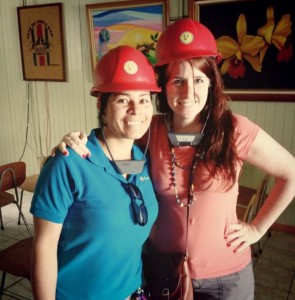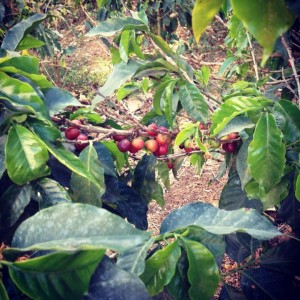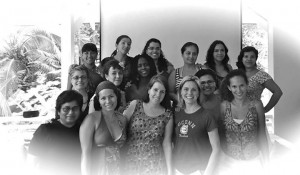by Bridget Burns, Advocacy and Communications Director
In the middle of October 2012, Natalia Urena Retana of Santa Maria de Dota, Costa Rica, stepped into the WEDO offices in New York for the start of an eight day job shadow with her US counterpart (that would be me.) Natalia, who is based in Costa Rica and currently works for Earthwatch, and I were paired together as part of a multi-year, 2-way educational and cultural exchange program entitled “Empowering Women though Social Entrepreneurship,” whereby twenty young professionals from Costa Rica and twenty young professionals from the U.S. undertake fellowships to increase their knowledge about how to become effective social change agents using a social entrepreneurship model. The program, sponsored by the U.S. Department of State, also supports ten follow-up social change projects in local indigenous and Afro-descendant communities throughout Costa Rica, and allows for ongoing networking and collaboration between the foreign exchange program participants and their counterparts in the U.S.
Upon arrival at WEDO, Natalia took part in a number of WEDO strategy meetings, particularly around planning for the Post2015 development agenda, as well as knowledge sharing around work to promote women’s leadership in environmental decision making. Natalia in turn, shared with us work she had undertaken over the past several years with Earthwatch: to provide training and capacity building for more sustainable coffee farming practices throughout one of the largest and most well known coffee regions in the world, the Tarrazu region of Costa Rica. Although many commonly refer to the entire area as Tarrazu, the region is actually divided into three provinces, each running a separate coffee Cooperative: Coopetarrazu R.L. in San Marcos, Coope Llano Bonito R.L. in San Pablo, and Coopedota R.L. in Santa Maria de Dota.
Given the theme of the exchange program, as well as both of our interests, while at WEDO, Natalia and I began to explore gender equality in the context of production value chains as well as possible gender inequities in the Tarrazu area and how we might be able to work together on a project to promote women’s participation in the region. We had a few initial brainstorms before Superstorm Sandy swept in and cut the first half of our exchange a few days short.
Coffee, Gender Equality and Costa Rica
Less than five months later I found myself in the Dota region of Costa Rica. Natalia was born and raised in Santa Maria de Dota, and the coffee cooperative based there, Coopedota R.L., is much more than just her local cooperative, it is a core part of her community and family life– and it would be the focus of our work together.
For ten days, Natalia and I worked together on a long term strategy for the Coopedota R.L. cooperative to understand key gender issues and to develop a roadmap towards implementation of activities and strategies to enhance women’s participation in all levels of the Coopedota production chain.
There is a lack of statistics regarding the number of women working in the coffee fields, their education level and their opportunity for advancement. As highlighted through observation and interviews with men and women in Copedota in Tarrazu Coffee region of Costa Rica, many farms are registered under a woman’s ownership through inheritance or for tax benefit, but these women have little to no control over the property. Emigration of young men to the U.S. and other countries has also placed women in control of farms, however most women still look to male family and friends to make decisions on the farms production and finances. As a result of this, although officially women make up to around 40% of members in the Copedota cooperative, they have limited engagement in decision-making and administration for the cooperative. Research from 2008-2009 membership of the Copedota leadership shows that there was only one woman on the Board and one on subsequent cooperative committees.
Through our research of other initiatives to promote women’s empowerment in production chains, we summarized three possible parallel strategies for Coopedota, all which centered around the first step of defining gender equality baselines in the community (i.e. income, education, positions of leadership, etc.) and from there to develop a Coopedota Gender Plan of Action. The strategies which then followed could be:
Branding
-To register a coffee brand labeled to support a fully developed Gender Plan of Action at Coopedota R.L. which a certain amount of money from the sales of the coffee would be allocated to invest in initiatives, trainings, administration and evaluation. Coopedota R.L. could find special markets to sell the coffee brand to those who would value a model that supports gender equality. (For example, Coopedota R.L. coffee is the first certified carbon neutral coffee, made possible through sustainable coffee practices and was thereby the coffee of choice at the UNFCCC COP18 meeting in Doha, Qatar.)
Certification
-To review & research gender criteria of the current certification programs that Coopedota R.L. is certified like Fair Trade, Rain Forest Alliance, C.A.F.E. Practices to see which ones could have co-benefits from a Gender Plan of Action at the cooperative.
Capacity Building
-To design and implement a Women Leadership in Sustainable Coffee Production training program; a training model for women who are members of Coopedota R.L. to increase skills, promote empowerment and to promote a capacity building program in coffee production. Implementing workshops, delivering lectures, field trips, etc.
-Engaging men and male leaders in the training and capacity building model, including knowledge on gender equality issues, to ensure community ownership of activities and implementation.
With this basic information and understanding, we developed a Plan of Action to approach the Director of Coopedota R.L., for support in moving forward with some of the strategies we had outlined. Concerned that gender equality not be seen as merely a tool for profit, we began with the premise that gender equality and women’s empowerment is key to sustainable development, human rights and greater prosperity around the globe. The proposal to the Director was very well received and Natalia began working to implement a long term strategy for defining baselines on gender equality for the community and then developing a gender plan of action.
Most recently, throughout June and July, Natalia began implementing the first phase of this project- community workshops to support the development of gender baselines. These workshops engaged women in the community, both members and employees of the cooperative, and provided a methodology to understand women’s perceptions of their roles, obstacles and opportunities based on gender. A progess report of these efforts highlights initial results of these workshops and next steps in planning- it can be downloaded here.
Vision the Future
With the support of multiple engaged partners, Earthwatch, WEDO, the University of Connecticut, the University for Peace, and Coopedota R.L. Cooperative, the goal for the future is to use the knowledge and information being gathered at these workshops to begin implementation of key strategies (developed by the community and members of the cooperative) to promote gender equality in the coffee production of the cooperative. As one of the foremost coffee regions in the world, the hope is that these actions can serve as a model, not just for innovation and social responsibility in the production and value chains of the Costa Rican coffee industry, but also regionally and globally across multiple value chains. Looking beyond the local actions of the community, partners have already been in contact with the UN Global Compact and administrators of the Women’s Empowerment Principles (WEP), to highlight the actions of the cooperative on a more global scale. In addition, partners hope to review the process and implementation efforts of this project and develop a case-study for UN Women’s newly launched Knowledge Gateway for Women’s Economic Empowerment.
Time for a Coffee Break
Beyond the lessons learned and opportunities presented by the work launched through this program, the most valuable and rewarding aspect of participating in this type of exchange, was the time to share, reflect and truly co-create. We all face challenges of time and resources to be able to find space to learn from each other.
Natalia and I both brought different knowledge and experiences to the table, but were able to quickly find common ground through our mutual interests and shared values. When all the Fellows met together in Costa Rica at the end of the exchange, the projects which they presented on were all incredibly diverse, thoughtful, and collaborative. For all of us, it was a reminder of that building relationships is key to developing solutions.
Natalia and I will continue to work together as individuals, and support each other’s work through our organizations and our partners. This includes taking on key next steps for the Coopedota cooperative project, looking for opportunities to launch a parallel production chain project in my community in the Bronx, and finding ways, such as through the UN Women platform and the WEPs, to bring lessons learned into WEDO’s policy advocacy.






